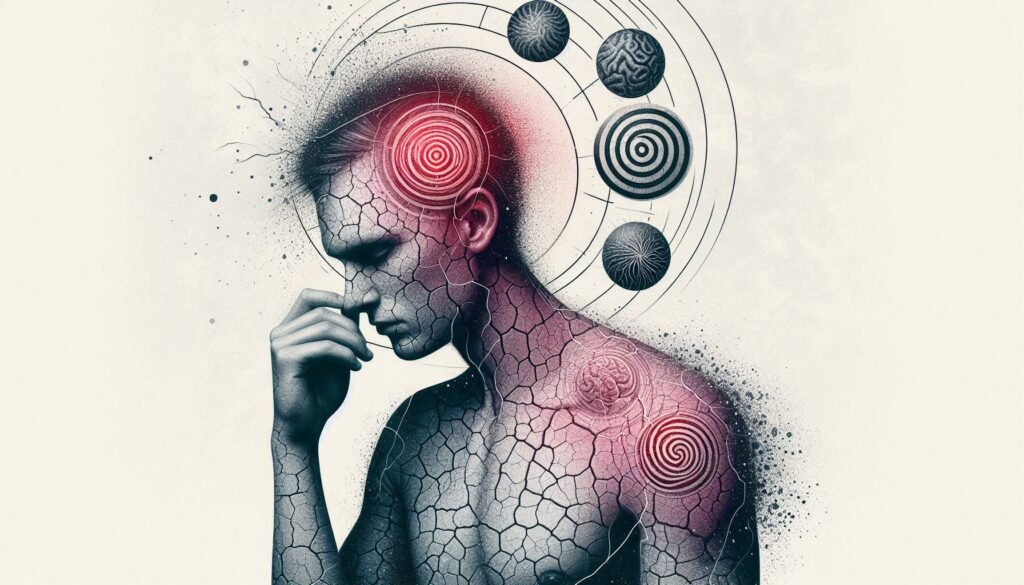Have you ever noticed how your stress levels can impact your skin? The connection between our minds and bodies is more profound than many realize, especially when it comes to neuroticism and skin conditions. This intricate relationship highlights a fascinating field known as psychodermatology, which explores the psychological effects that emotional states have on our dermal health.
Neuroticism often manifests as heightened anxiety, mood swings, or obsessive thoughts. These traits not only influence mental well-being but also play a significant role in various skin ailments. From flare-ups of acne to exacerbations of eczema, the emotional turmoil caused by neurotic tendencies can leave visible marks on our bodies.
In this post, we’ll delve into the compelling link between neuroticism and skin conditions. We will explore how personality traits impact dermatological disorders while offering insights into coping strategies for those affected. If you’re curious about understanding the mind-skin connection better or seeking ways to manage these challenges effectively, read on!

Psychodermatology: Understanding the Relationship Between Neuroticism and Skin
Psychodermatology is an emerging field that investigates the intricate connection between psychological factors and skin health. It emphasizes how emotional well-being can significantly influence dermatological conditions. Neuroticism, characterized by anxiety and emotional instability, plays a pivotal role in this relationship.
Individuals with high levels of neurotic traits often experience heightened stress responses. This chronic state of stress can lead to various skin issues, including inflammation and irritation. The body’s response to anxiety releases cortisol, which may worsen existing dermatological concerns.
Moreover, neurotic individuals are more prone to negative self-perception. This perception can exacerbate feelings of shame or frustration regarding their skin conditions, creating a vicious cycle that further impacts mental health. Consequently, these psychological challenges manifest physically on the skin.
Understanding this mind-skin connection opens doors for integrated treatment approaches. By addressing both psychological and dermatological aspects simultaneously, patients may experience more effective outcomes in managing their skin conditions.
Stress-Induced Skin Reactions: How Neurotic Traits Affect Dermal Health
Stress plays a pivotal role in skin health, particularly for those with neurotic traits. Individuals who are high in neuroticism often experience heightened anxiety and emotional instability, which can trigger stress-induced skin reactions. This connection is not merely psychological; it manifests physically through various dermatological issues.
When stressed, the body releases cortisol and other hormones that can lead to inflammation. This process may exacerbate existing skin conditions or even induce new ones, such as rashes or hives. The cycle of stress and its effects on the skin becomes a vicious loop that is challenging to break.
Moreover, people high in neuroticism may be more sensitive to environmental factors like temperature changes or irritants. Their emotional responses can heighten perceptions of discomfort, leading to increased scratching or picking at the skin—only worsening their condition.
Understanding this link between neurotic traits and dermal health allows for better management strategies tailored specifically for individuals prone to these reactions. By focusing on both mental well-being and skincare routines, improvements can be achieved.
Acne and Neuroticism: Emotional Factors in Breakouts and Flare-ups
Acne is more than just a skin issue; it’s often intertwined with emotional health, particularly for those exhibiting neurotic traits. Individuals with high levels of neuroticism tend to experience heightened anxiety and stress, which can exacerbate existing skin conditions like acne. The constant worry about one’s appearance can create a vicious cycle that fuels both psychological distress and physical flare-ups.
Emotional factors play a crucial role in how our bodies respond to stressors. When someone is prone to anxiety, their body releases hormones such as cortisol. This hormone stimulates sebaceous glands, increasing oil production on the skin’s surface and leading to breakouts.
Moreover, individuals who struggle with neuroticism may also engage in negative self-talk or ruminate over perceived flaws. This preoccupation can lead them to pick at blemishes or avoid necessary skincare routines altogether, further aggravating their condition.
Understanding this connection between emotional well-being and acne can encourage affected individuals to seek comprehensive treatment approaches that address both mental states and dermatological needs.
Psoriasis and Personality: The Impact of Neurotic Traits on Autoimmune Skin Conditions
Psoriasis is an autoimmune skin condition characterized by red, scaly patches. Research indicates that personality traits, particularly neuroticism, can influence the severity and management of psoriasis. Individuals with high levels of neuroticism often experience heightened emotional responses to stressors.
This increased emotional sensitivity may exacerbate psoriasis symptoms. Stress is a known trigger for flare-ups, and those prone to anxiety or negative emotions might find their skin condition worsening during tough times. The psychological burden associated with living with psoriasis can create a vicious cycle; as symptoms worsen, so do feelings of frustration and helplessness.
Neurotic individuals may also struggle more with self-image issues related to visible skin lesions. This can lead to social withdrawal or avoidance behaviors that further impact mental health. Addressing both the physical and psychological aspects becomes crucial in managing this complex interplay between psoriatic disease and personality traits.
Understanding these connections allows healthcare providers to tailor treatments effectively, considering both dermatological care and psychological support for improved overall well-being.
Eczema and Anxiety: Neuroticism’s Role in Atopic Dermatitis
Eczema, also known as atopic dermatitis, is a chronic skin condition characterized by itchy and inflamed patches. It affects millions, but those with neurotic traits often experience heightened symptoms. Anxiety can be a driving force behind eczema flare-ups.
Neuroticism is linked to emotional instability and excessive worry. Individuals high in this trait may find themselves more susceptible to stressors that exacerbate their eczema. The body’s response to anxiety can trigger the release of inflammatory substances, worsening the skin’s condition.
Moreover, the visibility of eczema can lead to negative self-perception and social anxiety for individuals with neurotic tendencies. This creates a vicious cycle where increased anxiety leads to more intense itching or scratching—further damaging the skin barrier.
Research indicates that managing anxiety effectively may alleviate some symptoms of eczema. Therapeutic interventions focusing on both psychological well-being and dermatological care are essential for these individuals seeking relief from their distressing skin issues.
Body Image and Self-Esteem: Psychological Effects of Skin Conditions in Neurotic Individuals
Neuroticism often exacerbates the psychological burden of skin conditions, significantly impacting body image and self-esteem. Individuals with high levels of neurotic traits tend to experience heightened sensitivity to their appearance. This can lead to a distorted perception of themselves when dealing with visible skin issues.
The emotional distress caused by conditions like acne or psoriasis can trigger negative thoughts about one’s worth and attractiveness. As these individuals focus intensely on their perceived flaws, they might withdraw from social situations or avoid activities that could expose their skin condition.
This withdrawal can create a vicious cycle. Isolation may deepen feelings of inadequacy and anxiety, further intensifying the relationship between neuroticism and skin problems. The struggle for acceptance becomes an overwhelming challenge.
Moreover, societal pressures surrounding beauty standards often amplify these feelings in neurotic individuals. When combined with existing insecurities, unrealistic expectations can make it even more difficult for them to embrace their natural appearance.
Skin Picking and Hair Pulling: Compulsive Behaviors Linked to Neuroticism
Skin picking and hair pulling are compulsive behaviors frequently linked to neuroticism. Individuals with high levels of neurotic traits often experience heightened anxiety, stress, or emotional distress. These feelings can manifest in the form of these repetitive actions.
Skin picking, clinically known as excoriation disorder, involves repeatedly damaging one’s skin. It serves as a coping mechanism for some people to manage their emotions or distract themselves from psychological discomfort. Similarly, trichotillomania is characterized by an irresistible urge to pull out one’s hair, leading to noticeable hair loss.
Both behaviors create a cycle where temporary relief is followed by guilt or shame about the action taken. This can exacerbate feelings of inadequacy and further increase anxiety levels.
Understanding this connection between neuroticism and these compulsive behaviors highlights the importance of addressing both mental health and dermatological issues together for effective treatment strategies.
Psychoneuroimmunology: How Neuroticism Affects Skin’s Immune Function
Psychoneuroimmunology explores the intricate relationship between our mind, nervous system, and immune function. This field shines a light on how emotional states like neuroticism can significantly impact skin health. Neurotic individuals often experience heightened stress and anxiety levels, which can lead to dysregulation of their immune responses.
When stressed, the body releases cortisol and other hormones that may impair immune function. These hormonal changes can make the skin more susceptible to infections and inflammatory conditions. As a result, people with high neurotic traits might find themselves dealing with flare-ups more frequently.
Research indicates that neuroticism correlates with increased inflammation in various skin disorders. Conditions such as psoriasis or eczema may worsen due to this psychological strain, creating a vicious cycle of stress exacerbating dermatological issues.
Understanding this connection is vital for effective treatment strategies. By addressing both psychological factors and physical symptoms simultaneously, we pave the way for holistic healing approaches tailored to individual needs.
Coping Strategies: Managing Skin Conditions in the Context of Neurotic Traits
Managing skin conditions while grappling with neurotic traits requires a multifaceted approach. First, establishing a consistent skincare routine can bring structure and predictability to daily life. This consistency often reduces anxiety related to skin appearance.
Mindfulness practices play a crucial role in coping strategies as well. Techniques such as meditation or deep-breathing exercises help individuals ground themselves during moments of heightened stress. These methods not only alleviate emotional turmoil but also promote overall skin health through reduced inflammation.
Additionally, seeking therapy or counseling can be beneficial for those dealing with the psychological effects of their skin condition. Cognitive-behavioral therapy (CBT) focuses on changing negative thought patterns that exacerbate feelings of insecurity and distress regarding one’s appearance.
Support groups offer an avenue for sharing experiences and gaining insights from others facing similar challenges. Connecting with peers fosters understanding and encourages positive coping mechanisms tailored to individual needs.
Holistic Approaches: Integrating Dermatological and Psychological Treatments
A holistic approach is essential when addressing the intricate relationship between neuroticism and skin conditions. Recognizing that both psychological and dermatological factors contribute to skin health can lead to more effective treatment strategies.
Integrating therapy, stress management techniques, and lifestyle changes with traditional dermatological treatments creates a comprehensive care plan. Cognitive Behavioral Therapy (CBT) has shown promise in helping individuals manage their emotional responses, reducing anxiety levels linked to flare-ups. Mindfulness practices can also aid in grounding individuals during stressful times, minimizing the impact on their skin.
Moreover, adopting a healthy diet rich in antioxidants may boost overall well-being while improving skin vitality. Regular exercise not only enhances physical health but also releases endorphins that combat stress.
Working closely with healthcare providers—dermatologists alongside psychologists—ensures a tailored strategy for each individual’s needs. This collaboration fosters an understanding of how emotions directly affect dermal conditions, allowing for targeted interventions that address both body and mind effectively. Embracing this integrated model paves the way for improved outcomes in managing neuroticism-related skin issues.


